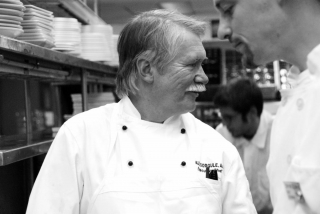
Internships When There Are No Internships
23 March 2020Create case study-based internships in partnership with area restaurants with the intent of building operational recovery programs.
By Paul Sorgule, MS, AAC
A high percentage of post secondary culinary programs include some version of internship or externship. During this crisis, those internships have already or will disappear as restaurants close, at least temporarily. This is, of course, a significant challenge for programs.
We might get lucky and see if the virus dissipates as the seasons change, but there are no indications this will come true. Additionally, epidemiologists are already predicting, as is the case with any other type of virus like influenza, that this virus will come back in some form with a vengeance in the fall. We need to plan accordingly for today and tomorrow. What can be done to maintain the integrity of our curriculum?
I propose we collectively look at the current crisis as an opportunity to teach problem solving and work the situation as a live case study that allows students to apply all they have learned thus far. This can be an opportunity to truly partner with restaurants in your community, the graduates’ future employers, and help them plan for recovery. A true partnership can be developed that provides a unique opportunity for real education to take place. Let’s view this situation as a learning or teaching moment.
It’s a challenging crisis to our educational programs. It’s also a transitional moment for the restaurant industry. All restaurants will suffer, as will the employees whose livelihood depends on it. Some restaurants will not be able to recover, while others will be, at the very least, challenged to determine how to return to normal. What better educational vehicle could we imagine than one that requires students to help find solutions to the multitude of problems that restaurants will face.
Restaurant issues will include general financial recovery, human resource issues, establishing even more stringent sanitation and food safety procedures, creating menus that reflect price points that attract customers, marketing, and a hard look at concepts of product delivery that may not be part of a restaurant’s current model. These issues align with nearly every course included in a culinary curriculum.
I propose faculty breakout of a focus on courses and collaborate on a comprehensive case study-based internship. The program administration would communicate with area or regional restaurants to develop internship partnerships with the intent of building an operational recovery program. Faculty would develop an outcomes model integrating objectives that align with course curriculum and propose a “Special Topics” internship to be offered in the short term without moving through the typical internal and external approval process. Challenging times require creative solutions. Students would be assigned to smaller teams and aligned with a particular restaurant challenge.
Communication would take place online between the student team, restaurant management, and team faculty mentor. The internship goal would be to prepare and present a recovery program for the restaurant once the opportunity arises to move back toward normalcy. The team’s assessment would include a rubric of input from the restaurant, faculty mentor, and self-assessment of team members. In the end, students would develop a better understanding of the challenges restaurants face, how to make decisions with all stakeholders in mind, establishing priorities, and thinking differently about a business that will likely be much different than it was just a month ago.
This model will carry student work through at least the fall 2020 term and likely beyond if the virus continues to challenge us. It is this type of creative thought that helps turn a crisis into an opportunity. It is this type of thinking that should take place among faculty members now. Become part of the solution – isn’t that what education is about? Think about the possibilities.
PLAN BETTER – TRAIN HARDER – THINK DIFFERENTLY
Paul Sorgule, MS, AAC, president of Harvest America Ventures, a mobile restaurant incubator based in Saranac Lake, N.Y., is the former vice president of New England Culinary Institute and a former dean at Paul Smith’s College. Contact him at This email address is being protected from spambots. You need JavaScript enabled to view it..
